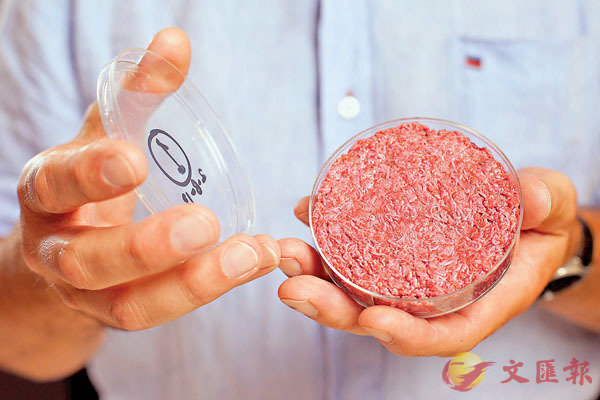 ■實驗室製作的培養肉可減少溫室氣體排放。圖為實驗室培養的牛肉。 資料圖片
■實驗室製作的培養肉可減少溫室氣體排放。圖為實驗室培養的牛肉。 資料圖片【原文】下文摘錄自香港《文匯報》12月3日︰
新加坡食品局(Singapore Food Agency)早前宣布,批准美國食品生產商Eat Just生產的實驗室培養(laboratory-grown)雞肉在新加坡出售,使新加坡成為全球首個批准培養肉(cultured meat)推出市面的國家。在食品安全、動物福利、環保等因素推動下,社會對人造肉需求愈來愈大,不過受價格問題影響,市面上最常見的仍然是植物肉(plant-based meat),Eat Just則期望在未來數年,將培養肉價格壓低至傳統肉(conventional meat)價格之下。
市面常見的Beyond Meat、Impossible Foods等人造肉品牌,主要仍只會生產植物肉,亦即以植物蛋白質(plant protein)為原料所製成的素肉;培養肉則是從動物身上提取細胞(cell)後進行培養,過程中亦需要加入蛋白質、氨基酸(amino acid)、礦物質(mineral)、鹽、糖,以至其他營養成分,整個過程均毋須屠宰(slaughter)動物。相較植物肉,培養肉的最大問題在於價格較昂貴。
Eat Just在2011年創辦,本港富商李嘉誠(Li Ka-shing)亦有份投資,公司早前在新加坡取得售賣許可(permit),會先在當地一間餐廳以雞塊的形態出售培養雞肉,並冠上GOOD Meat的品牌名稱,日後再逐漸拓展至零售市場(retail market),公司形容是「全球食物業一大突破(breakthrough)」。新加坡食品局表示,已評估Eat Just培養肉的製作過程、生產監管和安全測試,認為符合新加坡食品安全標準。
有關培養肉的價格問題,Eat Just行政總裁蒂特里克(Josh Tetrick)指出,推出市場的首半年內,雞塊售價會相等於高級雞肉價錢,不過隨着公司業務擴展至全球,有望降低至比傳統雞肉更便宜的價格。蒂特里克亦形容,雞塊的味道和口感(texture)都與真雞相同。
Eat Just還計劃在新加坡售賣用培養牛肉製作的漢堡包,預計明年上半年正式向當局提交申請。蒂特里克認為,新加坡在全球培養肉行業走在最前(at the forefront),可供美國、歐洲等地的國家參考,公司亦已開始與美國監管部門商討售賣培養肉事宜。由於全球的肉類消費量(consumption)預計會在2050年前上升70%,公司相信培養肉有助為人類提供安全、穩定的糧食來源。
擁有570萬人口的新加坡,逾90%糧食都依靠進口(import),新冠疫情亦對食物供應鏈(food supply chain)造成影響。落實出售培養肉,是當地穩定(stabilize)糧食供應的其中一環,新加坡同時期望在2030年前,實現全國30%食品都由本地生產,以減少依賴(reliance)進口食品。
Singapore issues the world's first regulatory approval for cell-cultured chicken
【譯文】The Singapore Food Agency (SFA) announced earlier that an approval had been granted to the U.S. food manufacturer Eat Just to sell laboratory-grown chicken meat in the country, making it the first in the world to approve such commercial launch of cultured meat on the market. The demand for meat alternatives has surged owing to the concerns about food safety, animal welfare, and environmental protection. Because of price issues, plant-based meat is still the most commonly seen alternative. Yet, Eat Just expects to charge the price of cultured chicken at a level lower than that of conventional one in the years ahead.
The most popular brands for cultured meat on the market such as Beyond Meat and Impossible Foods are mainly focusing on plant-based substitutes─the vegan meat made from plant protein. While cultured meat is produced by cells sourced from animals, added with a proprietary mix of protein, amino acids, minerals, salts, sugars and other nutrients, involving no animal slaughter in the entire process. However, the biggest problem of cultured meat lies in its exorbitant price when compared with plant-based meat.
Founded in 2011 with investment from Hong Kong tycoon Li Ka-shing, Eat Just obtained a permit for sale in Singapore earlier on, and plans to go on sale to a local restaurant in the form of chicken nuggets with a new brand called GOOD Meat and gradually expand into the retail market. The company described it as "a major breakthrough for the global food industry". SFA said it had fully assessed the manufacturing process, monitoring system and safety testing of the cultured meat of Eat Just, and deemed that it complied with relevant food safety requirements.
With regard to the price of the cultured chicken, Eat Just's chief executive officer Josh Tetrick pointed out that the nuggets would be priced at premium chicken prices in the first six months of its launch, and hopefully even below the cost of conventional chicken along with the company's gradual business expansion to the whole world. He described that the cultured meat was always regarded as replicating the flavor and texture of conventional one.
Eat Just even plans to sell hamburgers made from cultured beef in Singapore, and is going to submit a formal application to the approving bodies in the first half of next year. Tetrick believed that Singapore was at the forefront of the global cultured meat industry, serving as an example for the U.S. and other European countries, and the company had already kicked off negotiations with relevant U.S. regulatory authorities for the sale of such meat. Given that meat consumption by 2025 is projected to increase over 70%, the company believed that cultured meat would be able to provide a safe, steady global food supply.
Singapore, a city-state with 5.7 million people, currently imports over 90% of its food and its food supply chain has been adversely affected by the COVID-19 pandemic. Its approval for the sales of cultured meat is regarded as part of the local policy to stabilize food supply. Meanwhile, it strives to produce 30% of its own food locally by 2030 so as to reduce reliance on imported food.■龐嘉儀
Q&A
1. 目前各大人造肉公司主要研發了什麼產品?
2. 培養肉較傳統畜牧業能減少百分之幾的溫室氣體(greenhouse gas)排放?
3. 培養肉被指什麼成分過高?
4. 於2012年時用培養肉製成的一個漢堡包成本高達多少?
5. 長遠而言,預計培養肉將有助解決什麼危機?
Answer
1. 漢堡牛肉、雞柳、鴨肉、炸魚柳等
2. 80%-95%
3. 鹽分
4. 25萬歐元
5. 全球糧食危機(global food crisis)

